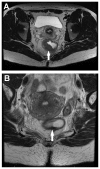Can less be more? Organ preservation strategies in the management of rectal cancer
- PMID: 31819706
- PMCID: PMC6878939
- DOI: 10.3747/co.26.5841
Can less be more? Organ preservation strategies in the management of rectal cancer
Abstract
Background: Total mesorectal excision (tme) is the current standard of care for the treatment of rectal cancer. However, that surgery is associated with significant morbidity and mortality. Clinicians and patients are seeking alternatives to radical resection. Currently, prevalent organ-sparing strategies under investigation include local excision and nonoperative management (nom).
Methods: We reviewed the current evidence in the literature to create an overview of the use of transanal endoscopic surgery and watch-and-wait strategies in the modern management of rectal cancer.
Results: Compared with radical resection, transanal endoscopic surgery in patients with early rectal cancer (cT1) having favourable histopathologic features is associated with an increased risk of local recurrence, but no difference in 5-year survival. In patients with T2 or early T3 cancer, strategies that use neoadjuvant or adjuvant therapy as adjuncts to local excision are under evaluation. Nonoperative management is a new option for patients who experience a complete clinical response after neoadjuvant chemoradiotherapy (ncrt). The selection criteria that will appropriately identify patients for whom nom will succeed are not established.
Conclusions: Local excision is appropriate for early rectal cancer with favourable histopathologic features. Although organ-preserving strategies are promising, the quality of the evidence to date is insufficient to replace the current standard care in most patients. Patients should be offered nom in the safe setting of a clinical trial or registry. Rigorous follow-up, including endoscopy and imaging at frequent intervals is recommended when radical resection is forgone.
Keywords: Rectal cancer; nom; nonoperative management; organ sparing; transanal endoscopic microsurgery; transanal endoscopic surgery; watch and wait; ww.
2019 Multimed Inc.
Conflict of interest statement
CONFLICT OF INTEREST DISCLOSURES We have read and understood Current Oncology’s policy on disclosing conflicts of interest, and we declare that we have none.
Figures


References
Publication types
MeSH terms
LinkOut - more resources
Full Text Sources

